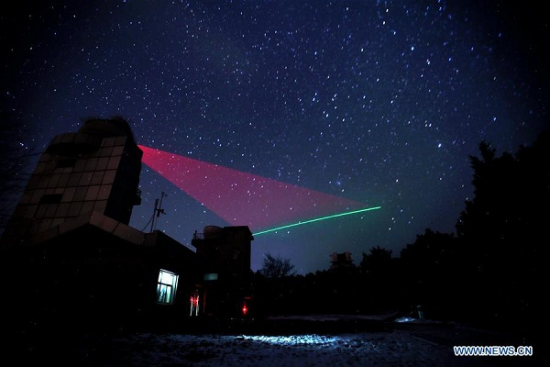
Photo taken on Nov. 26, 2016 shows a quantum communication ground station in Xinglong, north China's Hebei Province. (Xinhua/Jin Liwang)
China has made remarkable progresses in quantum science and technology over the past year, leaping to a world leading position in the field of quantum communications.[Special Coverage]
"A major breakthrough," " impressive achievement," "a milestone in the field..." When a series of Chinese scientists' achievements in quantum science and technology were published in the authoritative academic journals such as Science and Nature, their reviewers praised highly.
Chinese scientists recently became the first to realize quantum key distribution from a satellite to the ground, and quantum teleportation from the ground to the satellite, laying the foundation for building a hack-proof global quantum communication network.
The experiments were conducted with the world's first quantum satellite, Quantum Experiments at Space Scale (QUESS).
"The satellite marks a transition in China's role -- from a follower in classic information technology (IT) development to one of the leaders guiding future IT achievements," said Pan Jianwei, lead scientist of QUESS and an academician of the Chinese Academy of Sciences (CAS).
"Satellite-based quantum key distribution can be linked to metropolitan quantum networks where fibers are sufficient and convenient to connect numerous users within a city over 100 km. We can thus envision a space-ground integrated quantum network, enabling quantum cryptography- most likely the first commercial application of quantum information- useful at a global scale," Pan said.
The establishment of a reliable and efficient space-to-ground link for faithful quantum state transmission paves the way to global-scale quantum networks, he added.
Scientists expect quantum communications to fundamentally change human development in the next two or three decades, as there are enormous prospects for applying the new generation of communication in fields like defense, military and finance.
Nicknamed "Micius" after a 5th Century B.C. Chinese philosopher and scientist who has been credited as the first person ever to conduct optical experiments, the 600-kilogram-plus satellite was sent into a sun-synchronous orbit at an altitude of 500 kilometers on Aug. 16, 2016.
In June this year, Chinese scientists' first achievement based on the satellite was published as a cover article in the academic journal Science. In the experiment, scientists achieved distribution of entangled photon pairs over 1,200 kilometers, demonstrating that quantum entanglement, a phenomenon which is so confounding that Albert Einstein described it as "spooky action at a distance" in 1948, still exists at such a long distance.
"So far, this is the most important scientific research progress in my life," said Pan, who has been engaged in the quantum physics for more than 20 years and has been granted the highest natural science award for his achievement in quantum science.
"For the first time, we're testing the physical law of the micro world on a space scale, and laying the foundation for exploring more basic laws in physics in the future. The technologies can also be applied in constructing a quantum network," Pan said.
Soon after that, the other two achievements including satellite-to-ground quantum key distribution and ground-to-satellite quantum teleportation based on Micius were published in the same issue of Nature on Aug. 10.
Karl Ziemelis, chief physical sciences editor at Nature, said that with the publication of these new papers, Pan and his colleagues have completed their demonstration of a trio of quantum experiments that will be central to any global space-based quantum Internet.
"I mean you could say that the sky's the limit for quantum technologies, but that is a little bit conservative actually. They've gone beyond the sky with these latest experiments. And it's a testament to China's investments and significant efforts in the physical sciences that this group has been able to push research in practical quantum communication technologies to such an astronomical height," said Ziemelis.
Chinese scientists have completed all the experiments designed for Micius a year ahead of schedule. CAS president Bai Chunli said the achievements show China has reached a leading position in the field of quantum communication research.
"Micius has ushered in the construction of global quantum communication, the study of space quantum physics and experimental verification of quantum gravity theories. It helps China's race to control the command point of quantum science and technology, and enables China to become a leader in the field," Bai said.
As the world marveled at Micius, Chinese scientists have also made breakthrough in quantum computing.
Earlier in May, they have built world's first quantum computing machine that goes beyond the early classical -- or conventional -- computers, paving the way to the ultimate realization of quantum computing beating classical computers.
On a table of about three square meters in a lab in the Shanghai Institute for Advanced Studies of University of Science and Technology of China, the "baby" quantum computer made up of hundreds of components have nothing in common with people's daily used computer.
"Although it cannot even beat the mobile phone in your hands now, it's a great leap for the quantum computer, which one day could defeat conventional computer," said Pan.
He said that his team is expected to construct a quantum computer as powerful as the commonly used laptop at the end of this year, and aims to construct one triumphing over the currently most powerful supercomputer in 2020.
"A key period for the development of quantum computing is coming, which is like the bamboo shoots popping out after the rain," Pan said.
Due to the enormous potential of quantum computing, Europe and the United States are actively collaborating in their research. High-tech companies, such as Google, Microsoft and IBM, also have massive interests in quantum computing research.
Chinese scientists are exploring three technical routes: systems based on single photons, ultra-cold atoms and superconducting circuits.
During the initial development period of conventional computer from 1940's to 1970's, Europe and the United States took the lead. But in the new wave of quantum computing, China already has a leading edge in some fields.


















































